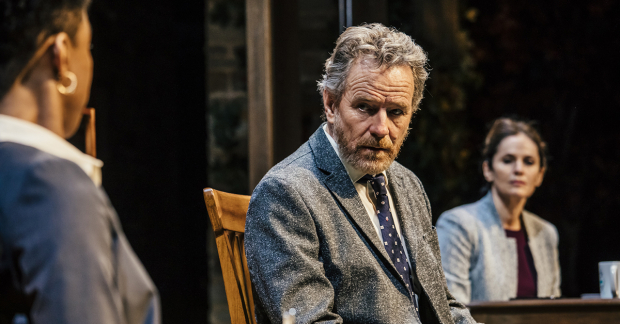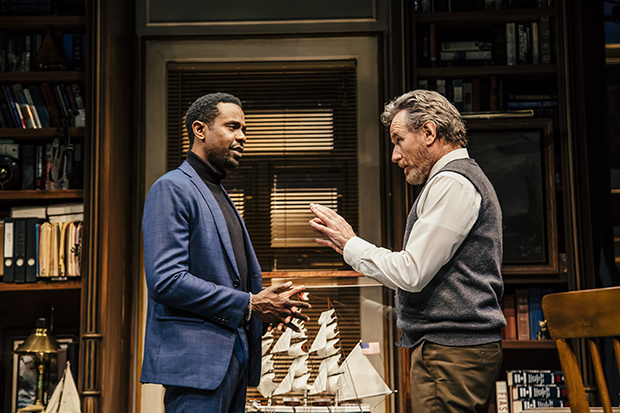Review: In Power of Sail, Bryan Cranston Is a Harvard Professor Flirting With the Alt-Right

(© Jeff Lorch)
A timely tragedy plays out in Paul Grellong's Power of Sail, indicting educators for placing discussion of hate — and the First Amendment — above safety and decency. Though the script loses focus, the cast assembled at the Geffen Playhouse by director Weyni Mengesha, led by Emmy- and- Tony-winner Bryan Cranston, invests in their characters to make a stirring, if chaotic, theatrical experience.
The concept pulls from history, in particular Alt-Right leader's Richard Spencer's attempted tour of college campuses in 2017. Tenured Harvard professor Charles Nichols (Cranston) finds himself at the forefront of student protests when the guest list of his yearly symposium has been leaked, causing fury over one guest: a devout white supremist. The dean of students (Amy Brenneman) and his star former pupil (Brandon Scott) beg him to drop the notorious speaker, but the way he sees it, only by shining a light on evil and exposing all its ugliness would it be forced to wither. Continuing to use the situation as a moral exercise, and ignoring the fact that this is not a classroom scenario, but the real world, Nichols blunders through the sticky situation with harrowing results.
Grellong's play raises vital issues but convolutes these with too many schematic twists which ultimately water down the issues themselves. Except for one righteous character and one who seems to exist only to bring local color to the proceedings, everyone in the play lies and sells out their decency, some for concealed, Machiavellian goals and some to cover their own asses. Some of the discussions are too obtuse for the audience to calculate, while others are so spelled out that they rob the audience from being able to draw their own conclusions. (Besides playwriting, Grellong produces TV procedural shows, and some of the components that make that genre successful, including surprise twists and revealing hidden agendas with flashbacks, are unsuccessfully utilized here.)

(© Jeff Lorch)
Cranston, in particular, is riveting on stage. No stranger to playing morally ambiguous anti-heroes after five seasons as Walter White on Breaking Bad, Cranston bathes in his character's short-sightedness. Nichols sticks to his guns even when it's apparent that he has already begun rationalizing his bad decisions to keep him believing he is a gallant leader. Cranston layers the mechanics of Nichols's naiveté with his self-knowledge that he's gone too far down the wrong path with no escape.
The play shortchanges Brenneman's character, making motivations cloudy, but the actor valiantly stays present in the role, playing an entire scene mostly silent, using only her body language to enact a full agonizing conversation with herself. As the one former and two current students, Scott, Seth Numrich and Tedra Millan, respectively, sturdily play the angels and devils resting on Nichols' shoulders. Donna Simone Johnson, calm and with a smile, cleverly displays how a federal agent can quell a suspect to pull out the truth.
Lap Chi Chu's exemplary lighting design is a perfect complement to Rachel Myers's extraordinary rotating set that carries the audience from the Ivy walls of Harvard to a deserted Amtrak station and finally to a neon-lit local bar. Without a curtain, the Geffen gives audiences plenty of pre-performance time to marvel at the detailed, realistic setting. Jonathan Snipes's sound design keeps the tension on the audience with the students' protests getting more pronounced throughout the evening.
Power of Sail speaks to many topics still ripping our country apart, but writer Grellong hasn't decided if he wants to focus on those issues or muddy the waters. No longer is the debated mission statement essential and the play devolves into a study of very flawed characters — not the premise with which the audience originally was presented.











